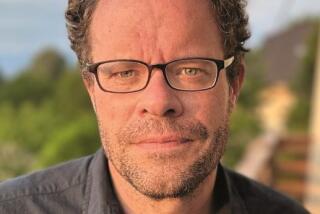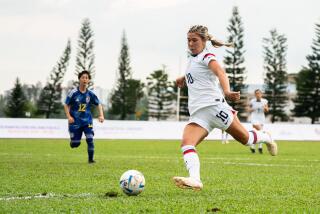NO CHALLENGE TOO GREAT : Loss of Sight and Hearing Fail to Slow the Competitive Drive of Rio Mesa’s Casey Cook
- Share via
Kathy Cook recalls vividly the day she looked out the kitchen window and saw her youngest son, Casey, hurtling out of control down the driveway toward the street on his sister’s bicycle. A moment of panic for any parent.
A bit more so when your son is blind.
“He went quite a way before he rammed into a parked car,” she said. “And then it was off to the emergency room of the hospital. Again. Casey has been in more hospital emergency rooms than I can remember.”
Cook laughs as the story is relayed to him.
“I guess I’ve given my parents a scare or two,” he said.
Angie Weatherford, a very young-looking 33, recalls the first time she met Cook.
“People always say that they can’t believe I’m 33,” she said. “People tell me all the time they figure I’m about 25. And after spending a few hours with Casey, he asked me how old I was. When I told him, he said, ‘C’mon. I thought you were about 25.’ He picked it up right away.”
Not a bad show of perceptiveness for a blind kid.
But a bit more remarkable when you know that Cook is also deaf.
“I was just astounded,” said Weatherford, who works as Cook’s sign-language interpreter. “I’ve worked with kids with these handicaps before, and I just couldn’t figure it out. He couldn’t see me and he couldn’t hear my voice, and yet he responded to me exactly the way everyone else does. I was just shocked.”
Cook, 17, said he had made the assumption that Weatherford was only in her 20s because of the energy she showed as she conversed with him in a special hand-in-hand code.
“That was the day I realized that Casey Cook is somebody very special,” Weatherford said.
Special. Remarkable. Rare. You hear those words often from the friends and family of Cook. He insists that he wants no special treatment, does not want to be singled out for any praise. He just wants to be one of the guys at Rio Mesa High, where he has run track and cross-country, wrestled for the varsity and now is one of the school’s best swimmers.
“As much as he doesn’t want any special attention, he will always stand out,” Weatherford said. “He’ll stand out because he’s such a rare, rare breed. He has such a tremendous drive and focus on what he wants to do. He has such determination.”
Cook’s athletic accomplishments include:
A victory in the 3,000-meter run in the 1988 Northern California Championships for Blind Athletes;
Six gold medals and three silvers in swimming in the 1988 U. S. Blind Athletic Assn. Summer Nationals in Indianapolis;
A bronze medal in swimming in the 1988 Paralympics in Seoul.
This week he is in Cape Girardeau, Mo., to swim in the USBAA’s 12-sport, seven-day Summer National Championships.
But his real accomplishments are in his daily life in a silent and dark world. Cook, however, has made a steely commitment not just to get through life, but to embrace it and take from it all it can give.
The Cooks’ oldest son, Chris, 25, is also blind and deaf. His condition was caused by Vogt-Koyanagi Syndrome, also known as Ocular Cutaneous Syndrome, an extremely rare and incurable disease that only afflicts males and ultimately causes blindness through detachment of the retinas, and later, deafness.
The first symptoms were dozens of white, snowflake-like spots of rapidly dying tissue that appeared on Chris Cook’s eyes at the age of 1 and robbed him of his sight and his hearing. Doctors assured the Cooks that the disease was not genetically transmittable, and they continued to build a family. Two daughters followed, then Casey was born in 1972.
With the assurance of specialists, the Cooks began raising their new infant, fully expecting a healthy boy to grow into a healthy man.
“But one morning, around his first birthday, I went in to wake him up and I saw the white spots,” Kathy Cook said. “Exactly the same white spots on the eyes that Chris had at the same age. It happened, literally, overnight.
“We couldn’t quite believe it. In the years since, every doctor we have talked with has said this is the only case they know of with two members of the same family being afflicted.”
Gradually, the light went out of Casey’s world. By the age of 8 he was blind. And then his hearing began to diminish, finally dissolving to total deafness last year. He spent several years at the California School for the Blind in Fremont and eventually worked himself into a regular curriculum at a Fremont high school.
And last fall, Cook came home and enrolled at Rio Mesa. The Oxnard Union High School District located Weatherford and hired her to be Cook’s eyes, ears and companion. She sits beside him in class, relaying the teacher’s words through the intricate system called tactile signing, in which she taps out the symbols for the words into the palms of Cook’s hands.
The system is so precise that even the subtle nuances of the English language are relayed to Cook, complete with laughter and emotion.
And, because his hearing loss became total only in the past 18 months, Cook speaks in a strong and clear voice.
“I don’t miss my vision that much,” he said, “but I do miss my hearing. After I lost my sight, my hearing became so important to me. And now, that’s gone, too. I miss being able to listen to music. And I miss hearing my friends.”
Cook’s father, Ron, played baseball at USC from 1962-66 and Casey grew up in an active sports family. Cook said that his decision to participate in sports was a natural one. He never considered not playing sports.
“I was willing to try anything,” he said. “Skateboarding and wrestling and running track and cross-country and riding a bike and even windsurfing. But swimming was always the sport I enjoyed most. And that’s because it’s a sport that I don’t need any help in doing. Just get me into the pool.
“I remember when I ran cross-country how much I enjoyed it. But I needed a guide to run with and I always heard the whispers from the other kids. I could hear them sneaking off when it was time to practice or race and overhearing them saying how they didn’t want to ‘have to run with that blind kid again.’ I just got tired of all that.”
In the pool, his mother or father or swimming Coach Sandy Nielson-Bell, who was a member of the U. S. Olympic swim team in 1972, follows Casey from one end of the pool to the other with a tennis ball attached to a pole. When he nears the end of a lap, he is tapped on the head with the tennis ball and immediately goes into a flip-turn.
“I think I lose about a half-second on each turn over sighted people,” he said, “but it’s not so bad that I can’t compete with them. It does make a difference, but I can overcome the difference.
“The hardest part about swimming blind is just swimming. Swimming is a very hard sport.”
He swims upward of 6,000 yards a day at the Pleasant Valley Swim Club pool in Camarillo and considers the 200-meter breaststroke his strongest event. Cook, who will complete his sophomore year at Rio Mesa this month, said that he hopes to improve his swimming skills enough to compete in college in three years.
“There’s no reason I can’t,” he said, “if I work hard enough at it.”
And, he said, there are other goals.
Sometimes I think about all my friends getting their driver’s licenses and zooming around in their cars,” he said. “Someday I’d like to walk out of the house, jump in the car and zoom on over to a friend’s house.”
At this, Kathy Cook’s eyebrows rise dramatically. She recalls her son flying down the driveway on a bike and slamming into the parked car. And now he’s talking about driving a car?
The eyebrows fall now and Kathy Cook smiles at her son. The day that he stops thinking about new things to do, about new adventures and new challenges and the day that he stops dreaming, then she will worry.
“When I meet people,” Casey Cook said, “I can sense immediately what they are thinking and feeling. I can tell that most people are trying to figure me out, as though they are examining a person from another planet. I can sense that strangeness when they meet me.
“But they get the hint pretty quickly that there’s no need of that. I’m just like them.”
More to Read
Eat your way across L.A.
Get our weekly Tasting Notes newsletter for reviews, news and more.
You may occasionally receive promotional content from the Los Angeles Times.






